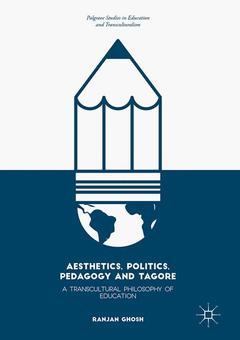Description
Aesthetics, Politics, Pedagogy and Tagore, 1st ed. 2017
A Transcultural Philosophy of Education
Palgrave Studies in Education and Transculturalism Series
Author: Ghosh Ranjan
Language: English
Subjects for Aesthetics, Politics, Pedagogy and Tagore:
Keywords
aesthetics; education; philosophy of education; politics; history; history of educaiton; culture
Approximative price 94.94 €
In Print (Delivery period: 15 days).
Add to cart
Publication date: 02-2017
214 p. · 14.8x21 cm · Hardback
214 p. · 14.8x21 cm · Hardback
Description
/li>Contents
/li>Biography
/li>Comment
/li>
This book provides a radical rethinking of the prominent Indian thinker Rabindranath Tagore, exploring how his philosophy of education relates to the ideas of Western theorists such as Kant, Plato and Aristotle. Tagore's thoughts on pedagogy, university and formal education are subjected to a fascinating critique within Ghosh's transcultural framework, referencing a wide range of thinkers across varying time periods, places, and cultures, and developing a greater sensitivity to other traditions, languages, and forms of thinking and writing. The book changes the way we have so far thought about the educationist Tagore, and will be of interest to scholars and specialists of literature, Indian history, and philosophy of education. It is political, deeply philosophical and has a transcultural take on our understanding of a variety of issues relating to Tagore and to philosophy of education in general.
Chapter 1. In and Out of Time: The Hungry Artist.- Chapter 2. No Schoolmaster: Aesthetic Education and Paedosophy.- Chapter 3. The Politics of Counter: Critical Education and the Encounters with Difference.
Ranjan Ghosh teaches in the Department of English at the University of North Bengal, India. His academic interests include literature, the nature of knowledge across disciplines, and the philosophy of education. He is widely published and is author of Thinking Literature Across Continents and Transcultural Poetics and the Concept of the Poet.
Offers a novel and radical rethinking of the prominent Indian thinker Rabindranath Tagore
Provides a rigorous critique of Tagore's thoughts, comparing his writing to those of other thinkers across times, countries and cultures
Calls for a greater sensitivity to other languages, cultures and traditions in the fields of politics and philosophy of education
© 2024 LAVOISIER S.A.S.
These books may interest you

Education for FullnessA Study of the Educational Thought and Experiment of Rabindranath Tagore 178.41 €



